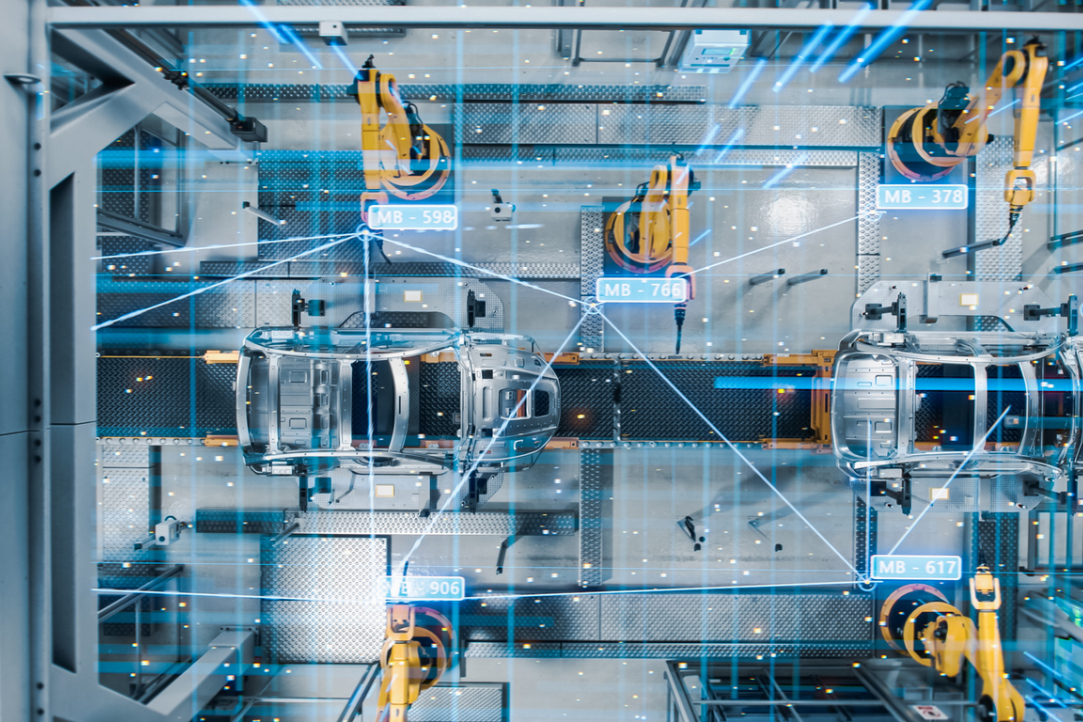Production of the Future: AI Research Centre Presents Its Developments in Manual Operations Control Systems

Researchers from the HSE AI Research Centre have built a system for the automated control of manual operations, which finds application in industrial production. The system facilitates the process of monitoring objects and actions, as well as controlling the quality of their execution.
Artificial intelligence technologies help automate human actions, simplifying their work, or completely replacing personnel. The automation of manual operations control in production goes even further: from selective quality control of products by the Quality Control Department to continuous monitoring of the entire assembly process.
Based on AI technologies, HSE scientists have developed a demonstration stand—one of the key components for testing developments before their implementation in production. Using computer vision, the automated system analyses the sequence of actions of the assembler, whether it is a robot or a human. This allows it to be determined if an important step was missed, or if an assembly action was incorrect. The system also evaluates compliance with safety techniques: the usage of personal protective equipment and absence of third persons or unrelated objects in the assembly area. With all actions logged in the system, individual performance indicators for each employee can be obtained. For the assembler, the system is useful because it alerts them if they forgot to perform a step or did it incorrectly. Ultimately, it significantly reduces the output percentage of defective products.

Viktor Minchenkov, project leader, Deputy Head of the Unit for Software Systems Development at HSE Tikhonov Moscow Institute of Electronics and Mathematics (MIEM HSE)
‘At the moment, we can track the sequences of semi knocked down and screw driving assembly. We can track the quantity and quality of an item placement on the workbench. We can track safety violations related to the use of personal protective equipment. In the final implementation, we can adapt the stand for controlling any technological process if it can be implemented through means of visual control.’
The project ‘Intelligent Automation of Manual Operations in Production’ of the AI Research Centre is being carried out by specialists from HSE Tikhonov Moscow Institute of Electronics and Mathematics (MIEM HSE) within the framework of the federal project ‘Artificial Intelligence.’
The main advantage of this developed system is that AI allows many actions to be performed equally well and even better than humans. One particular difference is that computer vision does not suffer from ‘fatigue’ as does human vision.

Sergey Slastnikov, Associate Professor at HSE School of Applied Mathematics of HSE Tikhonov Moscow Institute of Electronics and Mathematics (MIEM HSE)
‘Analogues of the developed system undoubtedly exist—there are quite a few local solutions for highly specialised tasks. In turn, we are developing our own approach, which potentially can be applied to a wider range of problems. As part of its testing, we are in collaboration with various domestic companies, both industrial and technological, for example, in the field of video analytics and IT services development. Several pilot projects have already been launched.’
The range of applications for this development is very wide. For example, the technology can be used as simulators for training with automatic assessment of the level of training or in video surveillance and video analytics systems, where malicious actions of humans can also be controlled.

Anton Sergeev, Director of the Centre for Software Development and Digital Services at HSE Tikhonov Moscow Institute of Electronics and Mathematics (MIEM HSE)
‘Our professional engineering and mathematical school and a project-based training model at MIEM allowed us to quickly put together a young but qualified team and implement computer vision technology for production. The created system is like an experienced digital mentor: it watches, advises, teaches, points out mistakes, and impartially and fairly evaluates efficiency. Data on process efficiency is automatically sent to the enterprise's ERP system.’
An important parameter of these systems is the speed of data collection (video or photos) for training embedded AI algorithms. This stage is also automated in the system and reduces the time and cost of implementation. The details of the approach were presented by the project team in the paper ‘Method of Automatic Images Datasets Sampling for the Manual Operations Control Systems’ in 2023.
See also:
‘HSE’s Industry Ties Are Invaluable’
Pan Zhengwu has spent the last seven years at HSE University—first as a student of the Bachelor’s in Software Engineering and now in the Master’s in System and Software Engineering at the Faculty of Computer Science. In addition to his busy academic schedule, he works as a mobile software engineer at Yandex and is an avid urban photographer. In his interview with the HSE News Service, Zhengwu talks about the challenges he faced when he first moved to Russia, shares his thoughts on ‘collaborating’ with AI, and reveals one of his top spots for taking photos in Moscow.
Scientists Present New Solution to Imbalanced Learning Problem
Specialists at the HSE Faculty of Computer Science and Sber AI Lab have developed a geometric oversampling technique known as Simplicial SMOTE. Tests on various datasets have shown that it significantly improves classification performance. This technique is particularly valuable in scenarios where rare cases are crucial, such as fraud detection or the diagnosis of rare diseases. The study's results are available on ArXiv.org, an open-access archive, and will be presented at the International Conference on Knowledge Discovery and Data Mining (KDD) in summer 2025 in Toronto, Canada.
Megascience, AI, and Supercomputers: HSE Expands Cooperation with JINR
Experts in computer technology from HSE University and the Joint Institute for Nuclear Research (JINR) discussed collaboration and joint projects at a meeting held at the Meshcheryakov Laboratory of Information Technologies (MLIT). HSE University was represented by Lev Shchur, Head of the Laboratory for Computational Physics at the HSE Tikhonov Moscow Institute of Electronics and Mathematics (HSE MIEM), as well as Denis Derkach and Fedor Ratnikov from the Laboratory of Methods for Big Data Analysis at the HSE Faculty of Computer Science.
AI vs AI: Scientists Develop Neural Networks to Detect Generated Text Insertions
A research team, including Alexander Shirnin from HSE University, has developed two models designed to detect AI-generated insertions in scientific texts. The AIpom system integrates two types of models: a decoder and an encoder. The Papilusion system is designed to detect modifications through synonyms and summarisation by neural networks, using one type of models: encoders. In the future, these models will assist in verifying the originality and credibility of scientific publications. Articles describing the Papilusion and AIpom systems have been published in the ACL Anthology Digital Archive.
HSE Researchers Develop Python Library for Analysing Eye Movements
A research team at HSE University has developed EyeFeatures, a Python library for analysing and modelling eye movement data. This tool is designed to simplify the work of scientists and developers by enabling them to efficiently process complex data and create predictive models.
‘Many Want to Create AI-Based Products and Become More Competitive’
In 2024, the online Russian-taught master’s programme ‘Artificial Intelligence,’ offered by the HSE Faculty of Computer Science, saw a record number of first-year students—over 300. What accounts for such a high interest in AI, how the curriculum is structured, and what new skills will graduates acquire? Elena Kantonistova, the programme’s academic director, shares more.
'I Would Like to Leave a Lasting Impact on Science'
Aibek Alanov pursues his own scientific research and leads two teams of scientists, one at HSE University and the other at AIRI. In this interview for the HSE Young Scientists project, he explores the parallels between today's AI researchers and early 20th-century physicists, discusses generative models, and shares his passion for bachata partner dancing.
HSE’S Achievements in AI Presented at AIJ
The AI Journey international conference hosted a session led by Deputy Prime Minister Dmitry Chernyshenko highlighting the achievements of Russian research centres in artificial intelligence. Alexey Masyutin, Head of the HSE AI Research Centre, showcased the centre’s key developments.
Drivers of Progress and Sources of Revenue: The Role of Universities in Technology Transfer
In the modern world, the effective transfer of socio-economic and humanities-based knowledge to the real economy and public administration is essential. Universities play a decisive role in this process. They have the capability to unite diverse teams and, in partnership with the state and businesses, develop and enhance advanced technologies.
AI on Guard of Ecology: Students from Russia and Belarus Propose New Solutions to Environmental Problems
An international online hackathon dedicated to solving environmental problems was held at HSE University in Nizhny Novgorod. Students employed artificial intelligence and computer vision to develop innovative solutions for image segmentation, predictive modelling (forecasting future events based on data from the past) of emissions and creating chatbots for nature reserves and national parks.


